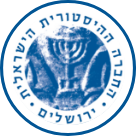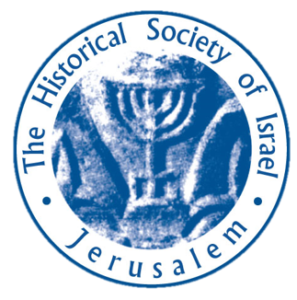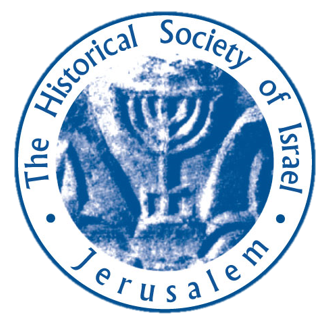BeLashon Avar
The book series, Beleshon avar, initiated by the Historical Society of Israel, aims to bring the Hebrew reader a selection of the best historical research in general history written and published by Israeli scholars in a variety of languages. The series editors select important research first published in other languages for publication in Hebrew, making it accessible to the Hebrew reader. The series deals with a range of different subjects and regions. The series is published by the Historical Society and Magnes Press, with the generous support of the Am ve’olam Foundation, in Memory of Shlomo and Bella Bartal for the Advancement of Historical Research in Israel.
Books published in the series to date:
Ami Ayalon – The Arabic Print Revolution, 2018 (originally published by Cambridge University Press, 2016)
Esther Cohen – The Modulated Scream: Pain in the Late Medieval Culture, 2019.
Additional books are expected to be published yearly.
The Jerusalem Lectures in History in Memory of Menachem Stern SeriesIn 1993, the Historical Society of Israel established a lecture series in memory of Prof. Menahem Stern, one of the most renowned historians of Jewish history of the Second Temple period. Prof. Stern served as the chairman of the Historical Society of Israel, editor of Zion, and chairman of the editorial board of the Zalman Shazar Center. Prof. Stern was murdered on June 22, 1989, while walking to the Jewish National Library in Jerusalem.
In his memory each year an internationally acclaimed leading historian is invited to Israel to deliver a series of three public lectures. The lecturers invited are among those whose unique contributions to historical research ranks them among the top scholars of our times. The lectures delivered at the Jerusalem Lectures in History in Memory of Menahem Stern showcase research that has never before been presented.
The lectures are published in English by the Historical Society of Israel through the University Press of New England, and in Hebrew by the Historical Society of Israel and Magnes Press in Jerusalem.
Hayo HayaThe journal Hayo Haya, is a unique project dedicated to the discipline of history in Israel that is written, edited, produced and promoted entirely by students. The journal publishes papers on topics of history written by students from universities all over the country. All the published papers, which began as outstanding university assignments in various fields of history, after their acceptance for publication, undergo rigorous editing and reworking into high-level research papers. Intended for the broad public, the journal seeks to contribute to the advancement of historical research in Hebrew while offering a platform for beginning scholars in the various fields of historical research.
Inspired by the Hebrew University’s Institute for History, the Journal aims to encourage multidisciplinary writing and cross pollination between students from all the historical research fields and academic institutions. This goal is reflected both in the journal’s editorial board, which is comprised of students from the various departments, and in the range of topics covered in the published papers.
Publication is funded by the Dan Meishar Foundation, initiated by Nathan Fisher, in memory of his oldest grandchild, and is supported by the Hebrew University of Jerusalem’s Institute of History. Beginning 2020, Hayo Haya is also sponsored by the Historical Society of Israel.
ZmanimZmanim, a quarterly journal devoted to history, was founded in 1979, at the initiative of historians Prof. Zvi Yavetz, Prof. Shaul Friedlander and Prof. Haim Shaked in the School of Historical Studies at Tel Aviv University. The journal is published in collaboration with the School of Historical Studies at Tel Aviv University, the Department of History, Philosophy and Jewish Studies at the Open University and the Historical Society of Israel and is published by Balmada, the publishing house of the Open University.
HistoriaThe academic journal Historia is a biannual publication first published in 1998. Forty-four volumes have been published to date.
The lack of an appropriate platform in Hebrew dedicated to world history led to the Hebrew reading public’s distancing from the discipline. Identifying this lacuna, HSI initiated the Hebrew language journal Historia as a platform for research in the field of world history. Each issue includes articles on various cultures, periods and geographical areas dealing with diverse aspects of world history. The majority of the contributors to this journal are Israeli scholars, and the Israeli experience is implicitly and explicitly imprinted in their work. Historia also aims to encourage a dialogue among scholars of different orientations and specializations within the Israeli and Hebrew-reading community of historians. Some issues of Historia are devoted to a central theme. Each issue also includes a book review section.
Editors: Prof. Michal Biran, Prof. Alexander Yakobson, Prof. Ruth Ginio and Prof. Joseph Ziegler.
Editorial Secretary: Dr. Ts’ela Rubel.
Articles submitted to the editorial board for publication undergo rigorous peer review by top-ranking scholars, as is customary in scientific journals around the world.
The journal Zion, published in Jerusalem since 1935, is considered the flagship Hebrew journal in Jewish history. Founded by Prof. Ben-Zion Dinur and Prof. Yitzhak Baer, the journal’s editors continue to be leading scholars in the field. Zion treats Jewish history throughout the ages from the biblical period to modern times. The journal features the best historians in Israel and worldwide as well as scholars from related disciplines, whose research sheds light on specific aspects of Jewish history. The journal devotes considerable space to book reviews, and its book review section serves as the definitive platform for new and important publications in the field of history.
Articles submitted to the editorial board for publication undergo rigorous peer review by top-ranking scholars, as is customary in scientific journals around the world.
Editors: Prof. Shmuel Feiner, Prof. Vered Noam, Prof. Nadav Na’aman, Prof. Miriam Frenkel. Editorial Secretary: Yechezkel Hovav.



